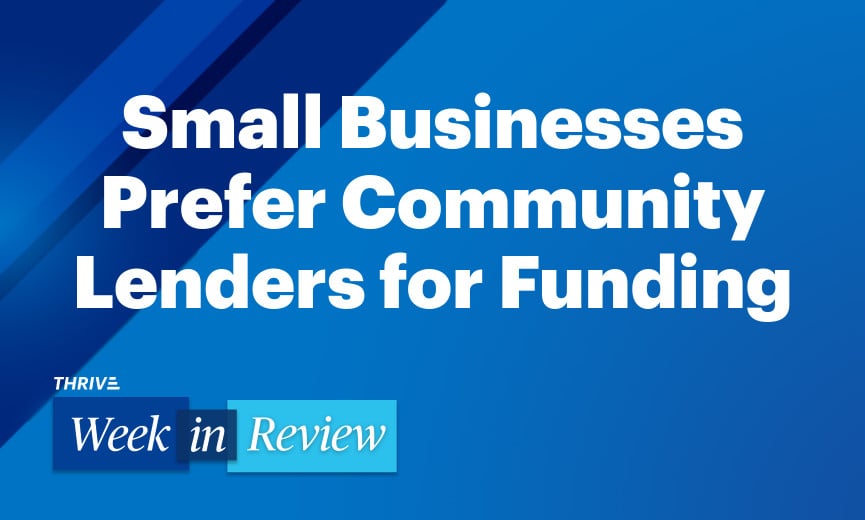- Thrive
-
Temporada
5Episodio42
Exceso de empleo, horas de trabajo remoto, finanzas de la generación Z, renovaciones automáticas
Podcast •
Vea
Resumen
One report reveals that some people are working five jobs, albeit doing it at the same time they’re working their primary job, while another report shows remote workers clocking more than 2.5 hours fewer than in-office colleagues. Gene Marks says he’s OK with both, as long as the work is getting time on time and to spec. Speaking of time, Gen Zers apparently need to spend more of it learning about finances while employers need to spend more of it teaching financial literacy. Startups hit near-historic highs in June with 460K jumping into the small business world, plus they’ll get a boost from a victorious lawsuit that allows them to continue using auto-renewals on subscriptions and memberships without facing any penalties.
Otros recursos
Ver transcripción
Hey everybody it's Gene Marks, and welcome to this week's episode of the Paychex THRIVE Week in Review podcast. This is where we take a few items in the news and we talk about them a little bit. This week, actually, I got a lot of news items to talk to you about.
Usually, I only have like three items but this week there's a lot that was going on and I want to share them with you because they impact both you and me as business owners. So, let's get right to it shall we.
The first item comes from Fortune.com. A new study that came out that said that bosses are catching on to their over-employed staff. One worker saying they're making $3,000 a day doing five separate jobs
So, here's what the article says. It says, “If your current salary isn't cutting it, you're not alone. Thousands of workers are turning to over-employment, juggling multiple full-time jobs and, in some cases, raking in over half a million dollars a year. This trend has grown in popularity, especially among tech companies that have exhibited remote work. With AI, the walls of tech are coming down.” One user about this wrote on Reddit.
So, what do you think about that? You've got an employee full time, probably working remotely, and they're doing other jobs in addition to yours. Do you care? Well, personally, I don't. In fact, I just recently hired a really great employee – a remote employee – outside of, you know, in Florida, and I've also encouraged him. I said, listen, as long as you're getting your work done for me, even as a full-time employee, I'm okay with you doing outside work if that's something that you want to do.
Technology allows people to do just that. And for me, it's all about getting results, not necessarily about punching a clock.
Well, talking about punching a clock, there is another article that was on Fortune.com this week that sort of had the opposite thing to say. It was all about remote workers.
According to new data from the Bureau of Labor Statistics, remote workers are working two and a half hours fewer per day than workers that are coming to the office the entire time. So, these remote workers themselves are seen to be working less time than those people that are actually in the office.
So, according to Fortune.com, bosses’ suspicions about TV-binging remote workers may be right. Research reveals employees clock in 2.65 fewer hours on the job while working from home compared to their in-office counterparts. Despite the appeal of flexible schedules and some myth busting, it has been found that remote staffers can be less productive, fake work, and watch movies on the job.
Now, again, does that impact you? Does that bother you if a remote worker is working that much less? It gets back to me to the same issue as workers doing other jobs while they're a full-time employee of ours. If they're able to juggle it and get the work done, I'm actually still okay with that. I don't micromanage my remote employees – I have 10 of them. I don't really, whatever they're going to do, they're going to do as long as their clients are being taken care of and they're available for me when I need them to be available. So, if that only means they're working less hours, fair enough.
Now, some employers, they get really sticky about they want their employees to work eight hours a day, but it really depends on you as the employer and what the culture of your company is.
The next bit of news comes from the New York Post and it has to do with the Zoomers, the Gen Zers. Apparently, they don't know basic finances and you know who they're blaming? They're blaming their parents. According to a new study, it found out that on average Zoomers, the Gen Z generation – these are people like in their early to mid-20s – they actually score only 30% in correct answers that they answered on a financial literacy test.
It turns out that these Zoomers don't know enough about their finances that we might think about. Three out of four of them wish they were taught Finances 101 in school because they don't feel prepared. Now, this is according to a recent report from Intuit, the makers of QuickBooks.
And again, who do they blame? Well, they blame their parents. Why? Because if Zoomers aren't balancing the books and they fall behind in the cash, lot of Moms and Dads just write them a check and takes care of the difference. Well, that's no way to teach people about financial literacy, is it?
Why is this important? If you're a Zoomer, if you're in your early 20s, your mid-20s, you're thinking of starting up a business, please know running a business has a lot to do with math. You need financial literacy to run a business and be a good businessperson. My best clients are financially literate. And on top of that, if you're an employer and you're employing Gen Z workers, those Zoomers, know that a lot of them don't have the financial literacy knowledge that you might think that they have.
It all comes down to education. Younger people need more education about financials, about taxes, about cash flow, about managing and understanding statements that have to do with numbers. You got to test your employees to make sure they understand the numbers. And again, if you're a young person, you want to start up your own business, make sure you know your numbers. It's really, really important.
All right, the next story actually comes from the Federal Reserve of St. Louis, their FRED, which is their reporting place. It's drawing on data that was recently released from the U.S. Census Bureau. Startups, new applications for startups, are still booming in the U.S. Just last month, this is the month of June, there was almost 460,000 new applications for new businesses filed in the United States.
Now, it's less than it was during COVID, where the numbers exceeded more than 500,000 a month. But before COVID, the average number of new startups ranged anywhere from 200 to 250,000 startups per month. We are still at a level of 460,000 and that is somewhat consistent with what it's been over the past few years.
Americans are starting up businesses at a breakneck pace and it doesn't come as any surprise to me. It's easy to start up a business. A lot of people are doing side gigs to make extra money. Some of them are doing it to put money in their pockets. Others are doing it to pay the bills in these inflationary times. Some, like those remote workers I talked about earlier, might have a few extra hours to do a side gig from home. And plus, it's so easy to start up a business nowadays: the technology, the filings, it's a very easy thing to do.
That's why we're seeing so many new entrepreneurs in this country. So, startups in America, entrepreneurism in America, still very, very strong.
Finally, my news comes from the National Federation of Independent Businesses. They won a lawsuit last week and they're really happy about it. It was against the FTC and the FTC's automatic renewal law. Let me read for me from a press release from the National Federation of Independent Businesses.
They celebrated a victory in a lawsuit in the Eighth Common Pleas Court. They issued a legal challenge against the FTC's negative option rule, which targeted small businesses that engaged in automated renewals of subscriptions or memberships. Yesterday, well actually this was last week, the court ruled in favor of small businesses and vacated what they call harmful rule.
According to Beth Milito, who is the vice president and executive director of the NFIB Small Business Legal Center, “The FTC went far beyond their authority in enacting this rule. The NFIB is pleased that the court recognized the procedural failures that took place in the rulemaking process.”
So, if you are a small business and you've got a website that does automatic renewals, for example, of memberships or subscriptions, you were facing some serious rules from the FTC and potential penalties for doing that. But now no more. You can continue to do business as you've done before.
My name is Gene Marks, and you have been watching or listening to the Paychex THRIVE Week in Review. This is where we take a few items in the news and talk about them. Hopefully you got some good information from here.
By the way, if you need any advice or tips or help in running your business, please visit us at paychex.com/thrive and sign up for our newsletter. And on July 24 and also during that week, we are doing webinars at Paychex where I am going to be moderating a panel of financial experts digging into the new tax bill, how it impacts you and your business. And if you're a CPA, how it impacts your clients, as well. So, look for the link at paychex.com and hopefully in the show notes to the show where you can sign up for one of those webinars.
Thanks so much for watching or listening. I'll be back with you next week with some more news that impacts your business. Take care.
Do you have a topic or a guest you’d like to hear on THRIVE. Visit payx.me/thrivetopics and send us your ideas or matters of interest. Also, if your business is looking to simplify your HR, payroll, benefits or insurance services, see how Paychex can help. Visit the resource hub at paychex.com/worx. That’s W-O-R-X. Paychex can help manage those complexities while you focus on all the ways you want your business to thrive.
I'm your host, Gene Marks, and thanks for joining us.
This podcast is property of Paychex, Incorporated, 2025. All rights reserved.

 Apple Podcast
Apple Podcast Spotify
Spotify iHeartRadio
iHeartRadio









